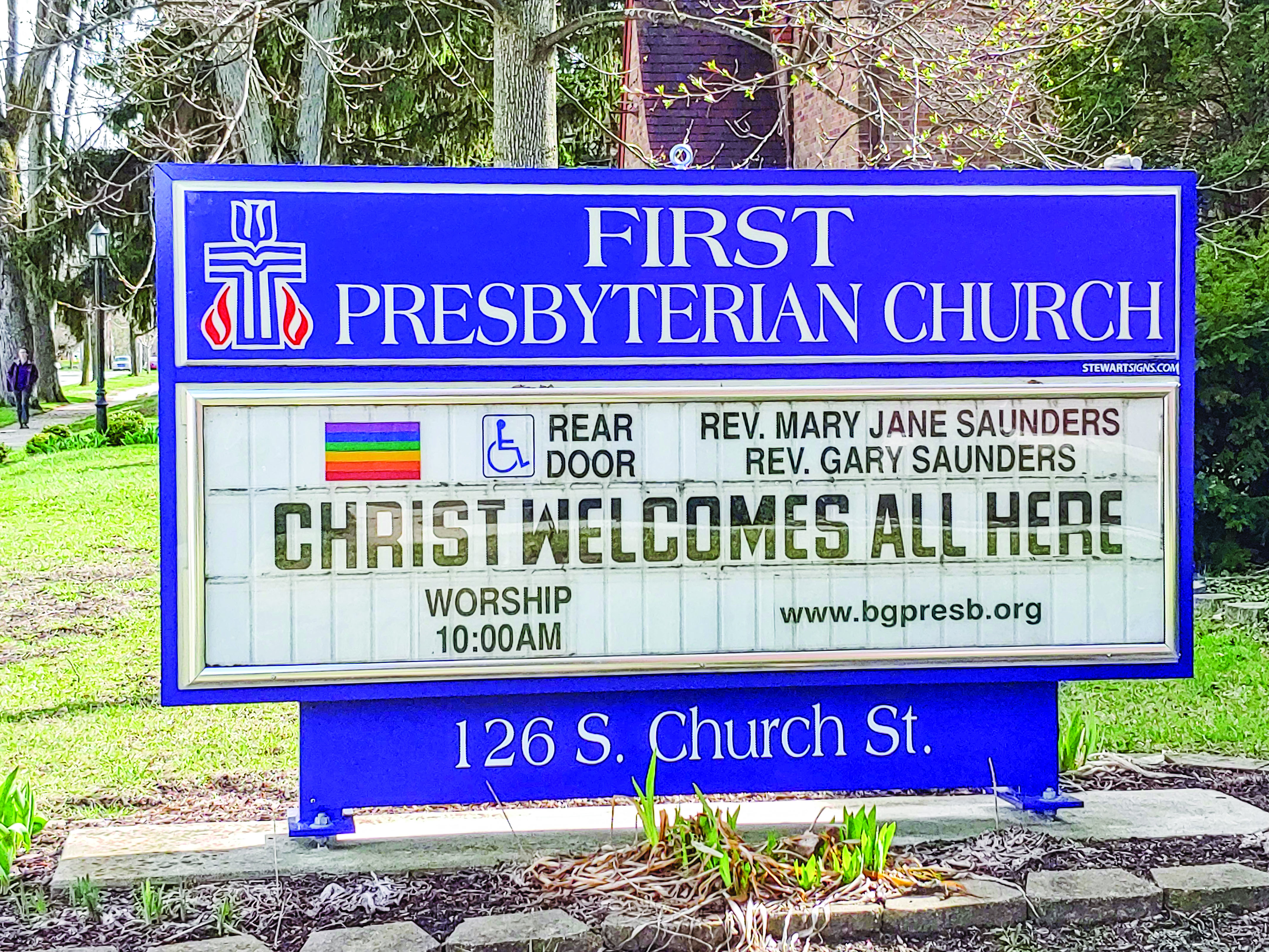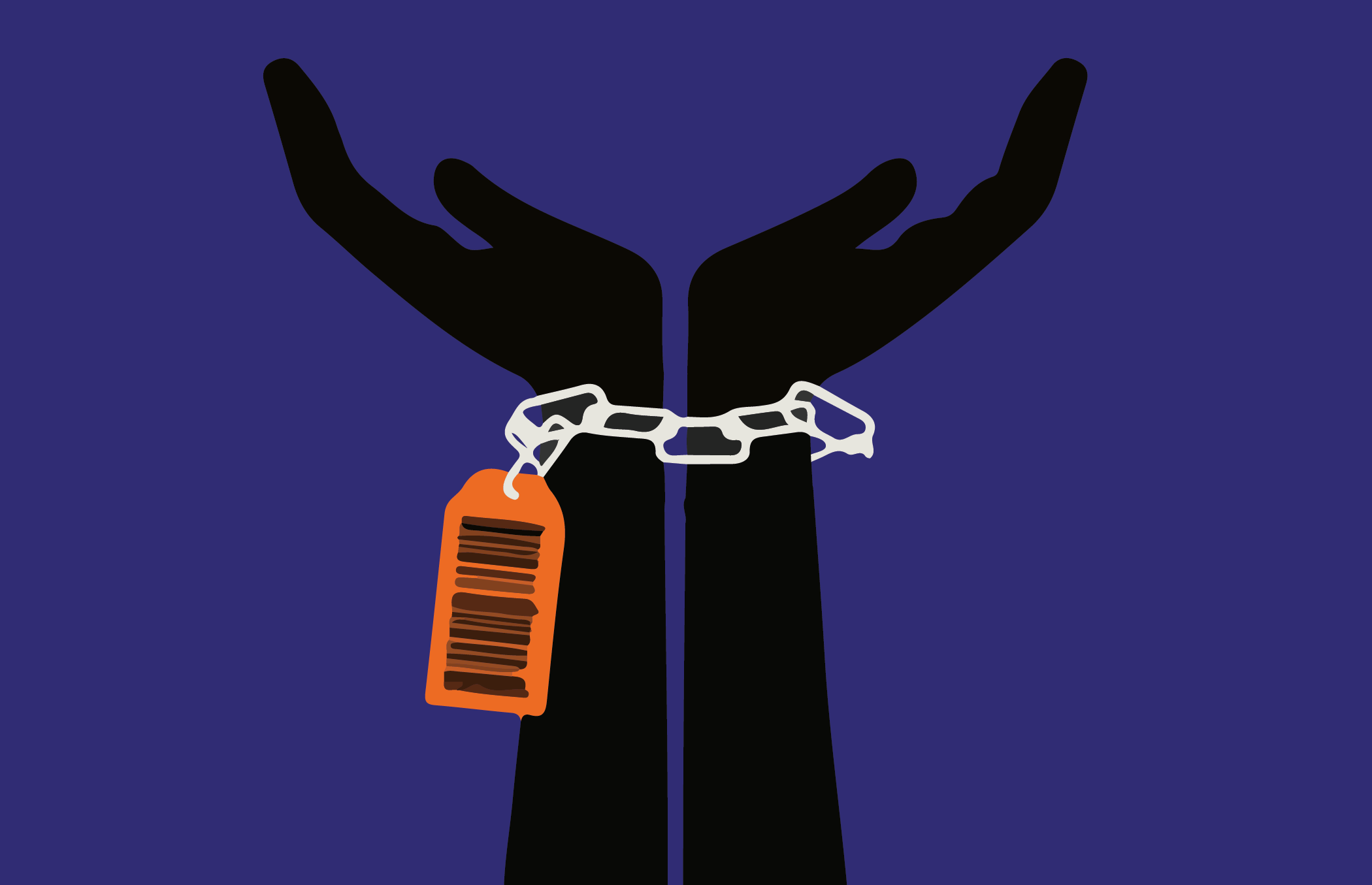LGBTQ
folks in faith
A welcoming attitude isn’t enough for LGBTQ-affirming churches
By Meredith Siegel || Spring 2019
While it may seem like a reconciliation, LGBTQ Christians exist, as well as churches that truly welcome them. LGBTQaffirming churches tell the community they are welcome and they won’t have to change anything about themselves.
Gay and trans Christians are often told they must give up that part of their identity, whether it be through subtler messages like encouraging abstinence or more dangerous practices like conversion therapy.
While historically Christian churches have been known for homophobia, citing several verses, often called “clobber passages” by the LGBTQ community, there are churches that affirm the LGBTQ members of their congregation.
In Bowling Green, this includes the Trinity United Methodist church and the First Presbyterian Church of Bowling Green. These churches perform same-gender marriages, baptize gay people and have openly LGBTQ leadership, who are not encouraged to be celibate.
Reverend Gary Saunders and his wife Reverend Mary Jane Saunders came to BG during a time when the city was discussing oridences put in place to protect things like housing and employment equality for LGBTQ people and became a leader in the community for those issues.
They find having an affirming and LGBTQ-full church to be “delightful.”
Their church, located on church street, has displayed the same message for the last ten years: a rainbow flag and the words “Christ welcomes all here.” The sign has only ever displayed one other message. Residents loved the message it displayed so clearly, that
the church unconditionally welcomes all people, including LGBTQ folks. This showcased they were affirming, a word used by inclusive churches to make it clear they unconditionally support LGBTQ folks.
“An affirming church is a church that believes homosexuality is not a sin, allows people of the LGBTQ community to get married and to be in full leadership. Anything less is non-affirming,” said Savannah Hinde, president of the United Methodist Student Organization, the only affirming Christian group on campus.
“We are a church that flies rainbow flags. Anything but affirming is not welcome here.” Gary mentioned the “but …” some churches bring up when welcoming LGBTQ people into their congregation. “(Sexual orientation and gender) is something to celebrate and affirm,” he said.
“So we’re not the ones that when you walk in the door — we’re not going to start talking about ‘Well, how can we change you to our cookie cutter version of what you ought to be.’” Even when a church is “loving” of the LGBTQ community, they may not be truly affirming or inclusive.
“They may love people who are in the LGBTQ community, but they will not allow them to be in full leadership without reconciling their identity,” Hinde said. This lack of full acceptance of LGBTQ folks is judgemental, in the words of Gary, at the least toxic while it’s hateful and dangerous at the most toxic. LGBTQ youth have attempted suicide at a rate five times that of straight youth, according to the Trevor Project. Additionally, LGBTQ youth who have experienced some sort of rejection are
eight times as likely to attempt suicide than their LGBTQ peers who have not experienced rejection. LGBTQ youths often feel shame when coming to terms with their sexuality or gender identity, with these ideas often stemming from the Christian paradigm about sex and gender.
“I don’t think they realize how much their policies hurt others,” Hinde said about non-affirming churches.
Hinde has seen other non-affirming churches on campus encourage newly out trans students to go back to their “born gender.” “What these churches do is say, ‘We love you, we love you as you are, we accept you as you are,’ and so this person’s like, ‘Oh my goodness, I’ve found an affirming church,’ and so they give it a few weeks or a few months until this person has built a strong community that they love,” Hinde said.
Then the pastor asks them to get a cup of coffee to start a conversation, and they “push them to change their identity.” Because they aren’t affirming, these churches open their arms to anyone but encourage them to change something about themselves once they’ve gotten further into their path as a Christian.
This can be a betrayal for LGBTQ folks and can lead to shame, forced celibacy or suicide. The majority of churches in the world are non-affirming. “The dominant voice in our culture is judgmental and kind of hateful, and it breaks our hearts,”
Gary said, speaking of himself and his wife. He mentioned his wife always apologizes to LGBTQ groups they speak to on behalf of their church for all of the hurt the Christian church has caused them.

Churches with the harshest views on LGBTQ issues are more fundamentalist, take the Bible literally and believe it is totally applicable to any time period.
Affirming churches generally do not take a fundamentalist look at the Bible, but rather place it in the cultural context in which is was written. “We have to understand that the Bible is a library; it’s not just a book that was written from cover to cover.
It’s a library of ancient texts written by humans grappling with what it meant to be human,” Hinde said. The Bible’s stance on these issues is not as important as John (one of Jesus’ disciples) saying, “God is love,” Gary said. He also prefers to not quote passages back and forth with other Christians and refers to trying to make a point this way as “Bible boxing.”
Overwhelmingly people have an understanding of the Bible “in our pocket” when going in to studying it, Gary said. “They have an understanding, and they’re looking for that. And you can find what you look for.” Rather he believes that the Bible should be read by considering the historical and cultural context.
Hinde has a similar understanding, saying the only two tenements Jesus gave were “love God and love your neighbor.” The rest is a cultural understanding and rule of that time period.
Hinde became empowered in this viewpoint when she discovered that other Christians are LGBTQ-affirming, as well as more radical things like being sex positive and pro-choice.
“Our church has hoped for ways to be able to communicate on campus, as young people are exploring their spirituality, and young people do, we want them to knowthat the very loud voice that says,
‘That’s very judgemental and communicates hatefulness to people with different sexual orientations; that’s not the only Christian viewpoint,’” Gary said.
“That one can explore these things in a much more open and loving kind of way.” When searching for affirming churches both Gary and Hinde give the advice of finding churches that are upfront about their acceptence of LGBTQ people.
“Ask and if they’re not upfront with it, leave,” said Hinde. “Churches will do whatever they can to make it seem as if they are affirming. If you don’t get an enthusiastic yes, you might want to find a new church.”
At its heart, Christianity is about love, and affirming LGBTQ folks can show that love.









